Another year is fast approaching its end, and with that, the holiday season is nearly upon us.
Now, we all know how important that is for businesses, especially for retail and small businesses. In fact, it is estimated that Q4 sales and revenue, on average, amount between 20% to 30% of the total annual figures, in some cases even getting close to 40%.
Add to this that data suggests the actual volume of online business in the holiday season keeps increasing every year, and expectations are that this trend will continue in the foreseeable future.
Holiday Season Shopping A Make-Or-Break Situation
So we can say that, for many, a successful sales outcome in the last quarter of the year can really be a make-or-break situation.
Whilst the opportunity is there, concerns about the current state of the global economy could also signal that we are in for some volatility in the markets. This can lead to potential swings in consumer confidence, which can ultimately affect shopping behavior.
It’s crucial, then, that we put our best foot forward with a strong online strategy coupled with an equally strong value proposition (more on that later).
Let’s start with the online strategy.
As we have seen, online shopping has been fueling sales year after year – and things have even accelerated since the start of the pandemic, with ecommerce becoming more of a driving force in the holiday season business.
Get Found When People Are Searching
With that in mind, the ability to be found when people are searching online is key for any web store or business. So today, we will focus on what are the best strategies for that and look at a few tips for bidding on holiday season trending keywords.
Before that, allow me a quick note to say that we write from Australia; therefore, seasonality and actual holiday examples might differ from those of the reader.
Keyword Research
Like many of the projects and tasks we work on, this one will start with good old keyword research to make sure that we have the most relevant and up-to-date list of terms that people might be searching for.
For that, there are plenty of tools, some paid, some free.
We can start with the most obvious one, Google’s Keyword Planner.
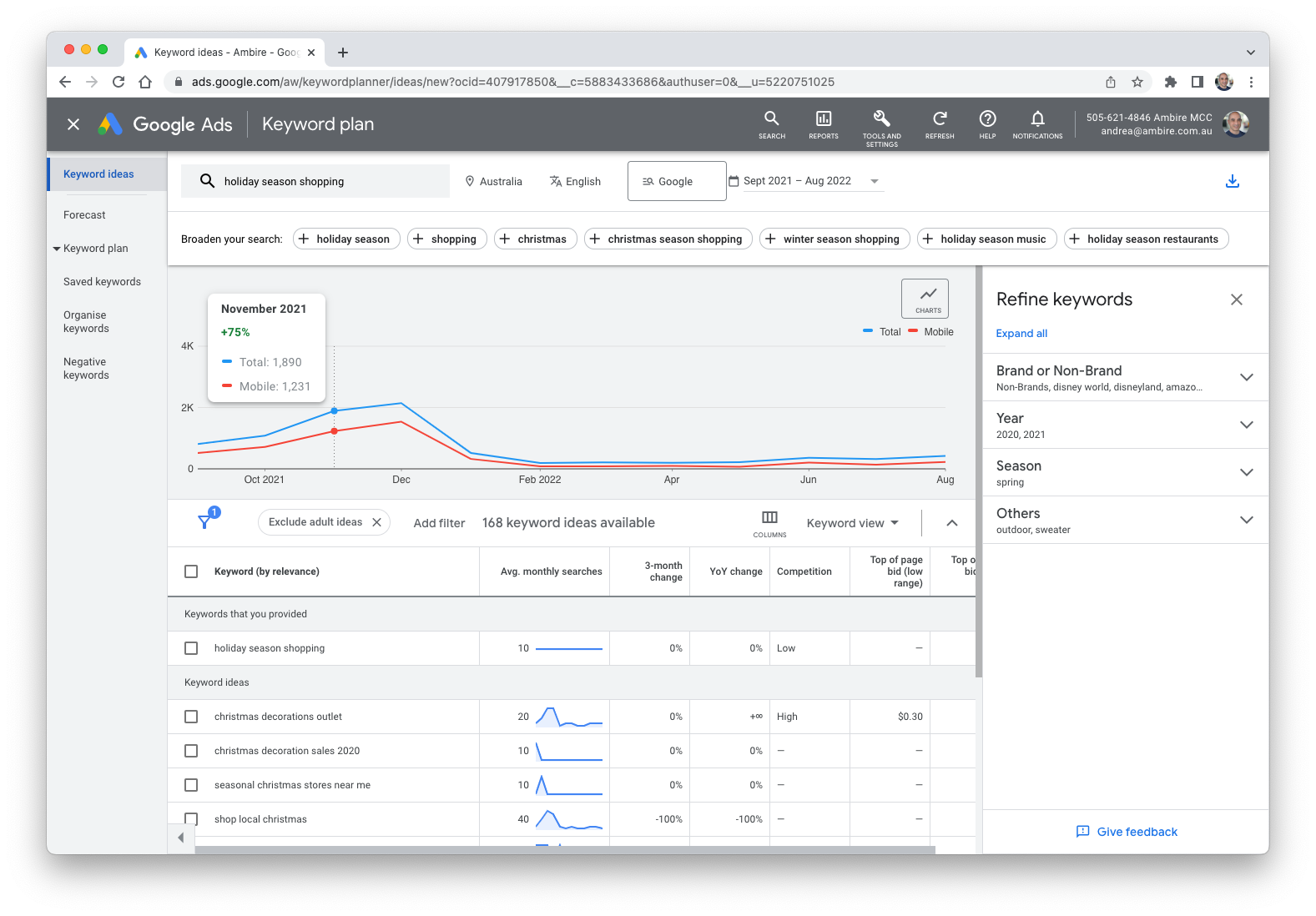 Screenshot from Google Ads Keyword Planner, October 2022
Screenshot from Google Ads Keyword Planner, October 2022For example, if we use “seed” keywords like “Christmas sale” or “Boxing day sale,” we get some very good suggestions and related terms such as “Boxing day sale 2022”, “Christmas clearance,” or “Boxing day deals,” etc.
At this point, we can also check the search trends by looking at the historical data, either using the preview window when hovering over a keyword, like in the screenshot below.
 Screenshot from Google Ads Keyword Planner, October 2022
Screenshot from Google Ads Keyword Planner, October 2022Or downloading the data and importing it into Excel or Google Sheets.
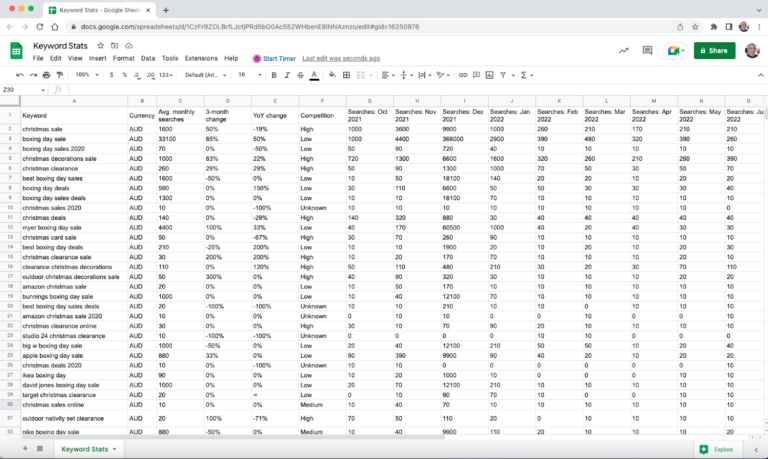 Screenshot from Google Sheets, October 2022
Screenshot from Google Sheets, October 2022Understanding when people search and their behavior might help us to gain an advantage over the competition, for example bidding at times when searches might be lower but also less competitive.
It is important that we have a clear and defined approach based on our business objectives and targets.
We mentioned above that the holiday season is a time ripe with opportunities, but with that said, we would strongly encourage you to keep your objectives and targets realistic!
How To Plan Holiday-Specific Ads
Being one of the busiest times of the year, ads for the holiday season must be relevant and compelling; we should therefore take the time to plan them, and our campaigns, well in advance.
With all the noise that we can expect the approach will be key to the success of the campaign.
Whether we focus on an emotional trigger or leverage on ads that aim to drive a rational response, it is important that we have the strongest creative and messaging possible, as well as a relevant and user-centric landing page.
For that reason, our ads must be specific and aligned with our audience’s expectations.
In the example below we use time sensitive headlines to instill a sense of urgency whilst drawing attention to the offer, whereas in the description of the ad we highlight the price point and fast, same day delivery.
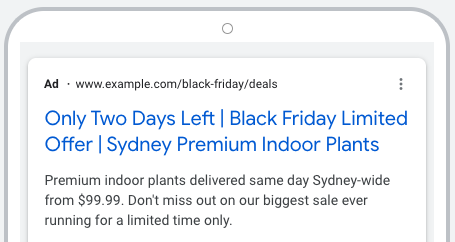 Screenshot from Google Ads, October 2022
Screenshot from Google Ads, October 2022Use any historical data available to gather information on what has worked in the past and what hasn’t, research online and across relevant forums to gather the users’ sentiment. Engage with them to gauge what they are looking for.
Being prepared, as opposed to making assumptions, will make a world of difference and be likely to avoid huge disappointments.
How To Plan Your Promotional Calendar
We mentioned above about using the Keyword Planner tool to deep dive into search volumes and seasonal trends. Likewise, that data should be at the core of our promotional planning and inform any content strategy.
Not only that but a shared promotional calendar will help keep all team members aligned and on the same page.
To set up a promotional calendar you can easily start with Google Sheets adding all the holidays and seasonal events that are relevant to your industry and target audience.
Once you have them all mapped out you can then add seasonal search trends. For that, starting with the keyword research, you can group together the search volumes by category to see when interest peaks during the year.
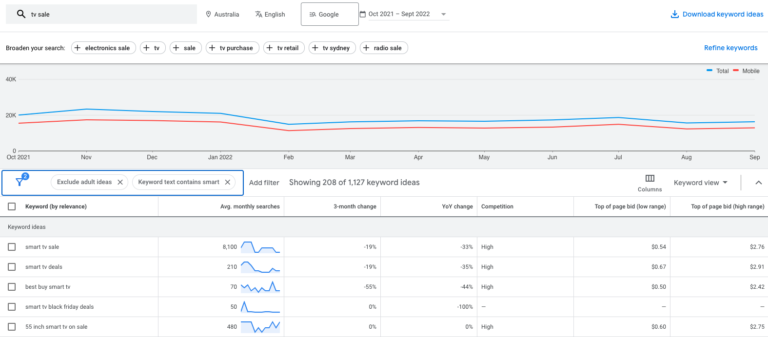 Screenshot from Google Ads Keyword Planner, October 2022
Screenshot from Google Ads Keyword Planner, October 2022For example, let’s assume you sell white goods, and you want to run a promotion that focuses on smart TVs; do you know when people are most likely to search for smart TVs?
Finding that information out and aligning your marketing efforts will greatly increase chances to succeed.
Data-Driven Planning
Similar to the U.S., here in Australia, the holiday season will start at the end of November. However, as we don’t have a Thanksgiving holiday, for us, things will kick off on the Black Friday/Cyber Monday weekend.
Even before that, we have a big, recurring online shopping event called Click Frenzy, which is an Australian ecommerce initiative inspired by Cyber Monday. This year, that will occur between the 8th and 10th of November.
Shopping Behavior
The common thread between Click Frenzy and Black Friday/Cyber Monday is that all events seem to attract a majority of people that are focused on finding good deals for items that they have already on their radar.
The expectation is exactly that: to find a good deal.
Why is that important? Because the most common search behavior is to look for the items in our wishlist at the right price. Therefore, searches will be dominated by queries that closely match those items, rather than more generic category terms.
Refining The Keyword List
So, in this case, the focus should be to make sure your strategy covers all the possible keywords people might be looking for and their variations and permutations, and to also include key combinations (i.e., “buy,” “online,” etc.)
Whilst most platforms allow you to lean on their AI and machine learning to cover all the different ways people might use to search, because of the limited data now available in the search query reports, we suggest having a comprehensive list of keywords.
This step is crucial and will allow you to understand which search terms/queries work for you and the ones that do not, making it possible to optimize the campaign.
As mentioned, at this point, you should focus on a detailed list of keywords that will include a variety of niche and long-tail terms, containing also product models and qualifiers.
For example, in our office last year, we were long looking to replace our local server and therefore searched for a particular NAS (Network-Attached Storage) model. We were not interested in other brands or models, just that one, and kept searching for it until we eventually found it at the right price.
The same might be true for other items, especially electronics, white goods, etc.
Dynamic Ad Groups And Search Ads
Now, complement that extensive list with the use of dynamic ad groups and search ads to capture even those unique search queries that Google says have never been searched before (and that accounts for 15% of the total), and you will be sure to have it all covered.
Bidding And Budget Management
Of course, with seasonality, we can expect that demand will greatly swing, so you want to make sure that your ads are visible for the keywords that you bid on for the holiday season but that you also account for that surge in demand.
This is where budget management is critical to ensure the ads don’t stop showing.
Google Ads has this covered for you with the option to enable seasonality adjustments:
“…for Search, Shopping and Display campaigns using Target ROAS and Target CPA bid strategies, as well as Smart Shopping and Performance Max campaigns using all bid strategies.”
-
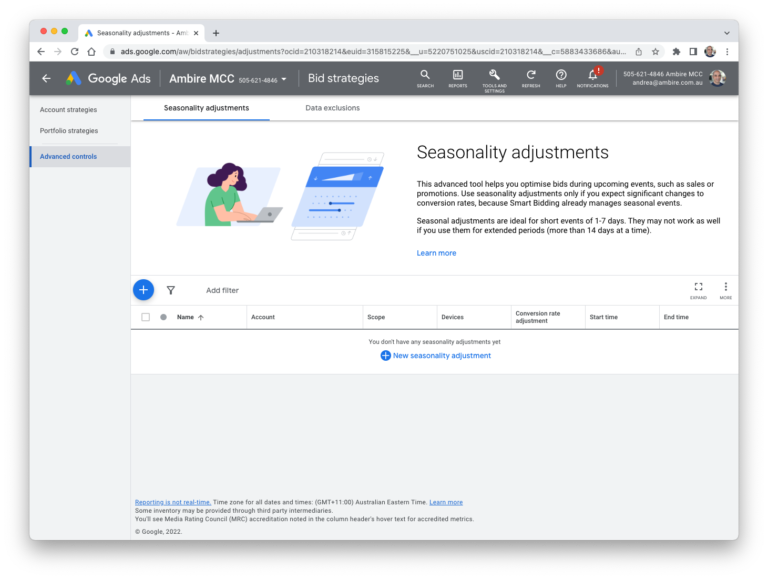 Screenshot from Google Ads, October 2022
Screenshot from Google Ads, October 2022
These are generally not needed for seasonal changes that occur over a long(er) period of time, but for short events like Black Friday/Cyber Monday, they can really help to ensure that automated bid strategies don’t get constrained by the sudden change.
Bidding On Broader Keywords
Past that and into December, you can expect that the search behavior will change as things ramp up for the Christmas period.
According to a 2020 study by Deloitte in the U.S., 39% of people plan to begin shopping on Thanksgiving or later, but at this stage, you might want to consider broadening your strategy and targeting to cover category terms and keywords that reach people looking for gift ideas and inspiration.
Unfortunately, that also means that some of those keywords are likely to be quite competitive and expensive; think, for example “gift ideas for man” or “baby toys.”
The other challenge will also likely be that people will be seeking the best value for money, and therefore browsing and comparison shopping.
Remarketing And RLSAs
Here it is important that, as a part of your bidding strategy, you close the loop with some remarketing campaigns.
In particular, you should put the emphasis on remarketing lists for search ads (RLSAs) in order to capitalize on strong search intent from people that have already interacted with your business whilst they are still in-market and actively searching.
Using RLSAs, you can pre-qualify your target audience and therefore bid on those more generic and expensive keywords we mentioned earlier while reducing the risk of generating few conversions and wasting ad spend.
RSLAs also allow you to use (positive) bid adjustments to target and bid more for those users that have added items to the cart and not completed a purchase, or tailor your offering to deliver a strong value proposition by throwing in extras such as special and/or limited time offers, extended support, free delivery and returns, etc.
While on the remarketing subject, first-party data should also be used to inform your strategy around existing and previous customers.
It is a no-brainer, and there is no point wasting ad spend bidding to reach users that have recently converted.
Leaning On AI And Machine Learning: Performance Max
We also mentioned earlier about leaning on AI and machine learning. For that, although technically not just a Search-only campaign, we could take advantage of solutions like Performance Max, where keywords are used as an audience signal.
-
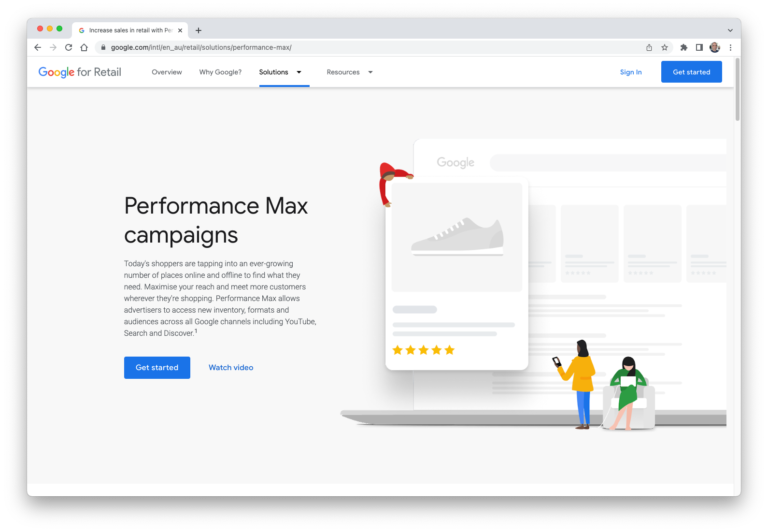 Screenshot from Google for Retail, October 2022
Screenshot from Google for Retail, October 2022 - With such economic uncertainty, people might think twice before making a purchase.
Being visible and interacting with your potential customers across multiple touch points is more important than ever, and solutions like Performance Max allow for that in an easy and scalable way.
The caveat is that keywords here are just one of the many audience signals you can add, so it is important to also ensure all other elements of your campaign are as strong as your keywords.
Best Tools For Scaling Thousands Of Products
As shopping goes, the holiday season is often the peak time for most industries and categories of products, therefore advertisers must be ready to scale up and fast, in order to maximize the opportunities and capture as much demand as possible.
Of course, that is no easy task!
And no matter how small or big the task is, it helps to use tools and platforms that allow advertisers to leverage on technology to achieve that, especially when they need to keep a close eye on (tight) margins and profitability.
Amongst the number of tools that marketers can use, project management and CRM tools can really help set up efficient processes and workflows.
Additionally, monitoring and scheduling software should be a must to keep the pulse on trends, stay up to date with our target audience sentiment, and to organize our social campaigns.
Editor’s note: Google also offers recommendations for advertisers with multiple or large accounts.
How To Track Your Holiday Campaigns And What Factors To Analyze
Once we have our objectives and targets defined, and our best game plan is on, it is time to measure the success of our holiday-season campaigns.
Since things are going to be quite competitive, and possibly expensive, we need to make sure that from the very get go we track and evaluate every interaction with our target audience.
If we have already managed similar campaigns in the past we can use the year-on-year data to set some benchmarks and expectations.
Allow for fluctuations due to external factors, but setting daily and cumulative targets will also help keeping track of your progress, whilst staying focused on the end goal.
Conclusion
So there you have it, a few strategies and tips and tricks for bidding on the holiday season trending keywords that we hope will help you to successfully connect your business with potential new (and returning) customers, and win at this key time of the year.
More resources:
- Health & Wellness Advertising Tips To Drive Holiday Sales
- Do Manual Adjustments Still Make Sense With Automated Bidding?
- 10 Most Important PPC Trends To Know In 2022
Featured Image: imtmphoto/Shutterstock





![AI Overviews: We Reverse-Engineered Them So You Don't Have To [+ What You Need To Do Next]](https://www.searchenginejournal.com/wp-content/uploads/2025/04/sidebar1x-455.png)